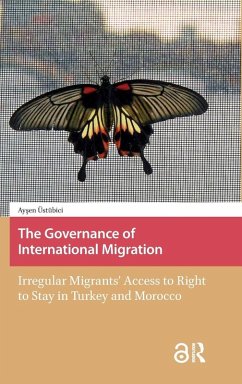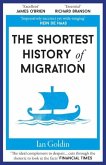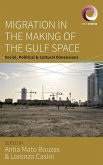Aysen E. UEstubici OEnay
The Governance of International Migration
Irregular Migrants' Access to Right to Stay in Turkey and Morocco
Aysen E. UEstubici OEnay
The Governance of International Migration
Irregular Migrants' Access to Right to Stay in Turkey and Morocco
- Gebundenes Buch
- Merkliste
- Auf die Merkliste
- Bewerten Bewerten
- Teilen
- Produkt teilen
- Produkterinnerung
- Produkterinnerung
The book analyses migrant experiences of illegality in Turkey and Morocco by taking into account how both countries responded to increasing pressure by the European Union to govern irregular migration within their territories.
Andere Kunden interessierten sich auch für
![The genesis of international mass migration The genesis of international mass migration]() Eric RichardsThe genesis of international mass migration111,99 €
Eric RichardsThe genesis of international mass migration111,99 €![Gender, Generations and the Family in International Migration Gender, Generations and the Family in International Migration]() Albert KralerGender, Generations and the Family in International Migration89,99 €
Albert KralerGender, Generations and the Family in International Migration89,99 €![The Land of Open Graves The Land of Open Graves]() Jason De LeonThe Land of Open Graves34,99 €
Jason De LeonThe Land of Open Graves34,99 €![The Penguin Book of Migration Literature The Penguin Book of Migration Literature]() The Penguin Book of Migration Literature10,99 €
The Penguin Book of Migration Literature10,99 €![The Shortest History of Migration The Shortest History of Migration]() Ian GoldinThe Shortest History of Migration11,99 €
Ian GoldinThe Shortest History of Migration11,99 €![The Other Windrush The Other Windrush]() Maria Del Pilar KaladeenThe Other Windrush104,99 €
Maria Del Pilar KaladeenThe Other Windrush104,99 €![Migration in the Making of the Gulf Space Migration in the Making of the Gulf Space]() Migration in the Making of the Gulf Space116,99 €
Migration in the Making of the Gulf Space116,99 €-
-
-
The book analyses migrant experiences of illegality in Turkey and Morocco by taking into account how both countries responded to increasing pressure by the European Union to govern irregular migration within their territories.
Produktdetails
- Produktdetails
- Verlag: Amsterdam University Press
- Seitenzahl: 250
- Erscheinungstermin: 30. März 2018
- Englisch
- Abmessung: 240mm x 161mm x 18mm
- Gewicht: 536g
- ISBN-13: 9789462982765
- ISBN-10: 9462982767
- Artikelnr.: 47821507
- Herstellerkennzeichnung
- Libri GmbH
- Europaallee 1
- 36244 Bad Hersfeld
- gpsr@libri.de
- Verlag: Amsterdam University Press
- Seitenzahl: 250
- Erscheinungstermin: 30. März 2018
- Englisch
- Abmessung: 240mm x 161mm x 18mm
- Gewicht: 536g
- ISBN-13: 9789462982765
- ISBN-10: 9462982767
- Artikelnr.: 47821507
- Herstellerkennzeichnung
- Libri GmbH
- Europaallee 1
- 36244 Bad Hersfeld
- gpsr@libri.de
Aysen Üstübici has received her Ph.D. from Koç University and University of Amsterdam through joint supervision. She is currently Assistant Professor at Koç University, Department of International Relations and Department of Sociology. Her research interests are irregular migration, gender, social policy.
Acknowledgements, Abbreviations 1 Introduction 1.1 Researching irregular
migration as 'migrant illegality' 1.2 Researching migrant illegality in new
immigration countries 1.3 Comparative research design and case selection
1.4 Data collection 1.5 Mapping the book 2 The production of migrant
illegality 2.1 Becoming lands of destination 2.2 The international context
in the production of illegality 2.3 Moroccan immigration politics from
criminalization to integration 2.4 Migrant illegality as Europeanization in
Turkey 3 Morocco as a case of political incorporation 3.1 Deportability as
part of daily experience 3.2 Illegality in (semi-)settlement 3.3 Access to
public healthcare and education 3.4 Reversing illegality through
mobilization 4 Turkey Depoliticized illegality and a quest for legitimacy
4.1 Migrant deportability beyond the EU borders 4.2 Illegality in
(semi-)settlement: Incorporation into informality 4.4 Reversing illegality:
Mobilization or moving sideways? 5 Migrant illegality beyond EU borders 5.1
Deportations and perceptions of deportability 5.2 Socio-economic
participation and daily legitimacy 5.3 Access to rights through
institutions and the role of 'street[1]level advocacy' 5.4 Reversing
illegality 6 Conclusions 6.1 Researching migrant illegality beyond
externalization 6.2 Production of migrant illegality at the international
and national levels 6.3 Migrant incorporation styles: The problematic role
of the market 6.4 Migrant mobilization between (in)visibility and
recognition 6.5 Ways forward, Annex, References, Index, List of figures and
tables.
migration as 'migrant illegality' 1.2 Researching migrant illegality in new
immigration countries 1.3 Comparative research design and case selection
1.4 Data collection 1.5 Mapping the book 2 The production of migrant
illegality 2.1 Becoming lands of destination 2.2 The international context
in the production of illegality 2.3 Moroccan immigration politics from
criminalization to integration 2.4 Migrant illegality as Europeanization in
Turkey 3 Morocco as a case of political incorporation 3.1 Deportability as
part of daily experience 3.2 Illegality in (semi-)settlement 3.3 Access to
public healthcare and education 3.4 Reversing illegality through
mobilization 4 Turkey Depoliticized illegality and a quest for legitimacy
4.1 Migrant deportability beyond the EU borders 4.2 Illegality in
(semi-)settlement: Incorporation into informality 4.4 Reversing illegality:
Mobilization or moving sideways? 5 Migrant illegality beyond EU borders 5.1
Deportations and perceptions of deportability 5.2 Socio-economic
participation and daily legitimacy 5.3 Access to rights through
institutions and the role of 'street[1]level advocacy' 5.4 Reversing
illegality 6 Conclusions 6.1 Researching migrant illegality beyond
externalization 6.2 Production of migrant illegality at the international
and national levels 6.3 Migrant incorporation styles: The problematic role
of the market 6.4 Migrant mobilization between (in)visibility and
recognition 6.5 Ways forward, Annex, References, Index, List of figures and
tables.
Acknowledgements, Abbreviations 1 Introduction 1.1 Researching irregular
migration as 'migrant illegality' 1.2 Researching migrant illegality in new
immigration countries 1.3 Comparative research design and case selection
1.4 Data collection 1.5 Mapping the book 2 The production of migrant
illegality 2.1 Becoming lands of destination 2.2 The international context
in the production of illegality 2.3 Moroccan immigration politics from
criminalization to integration 2.4 Migrant illegality as Europeanization in
Turkey 3 Morocco as a case of political incorporation 3.1 Deportability as
part of daily experience 3.2 Illegality in (semi-)settlement 3.3 Access to
public healthcare and education 3.4 Reversing illegality through
mobilization 4 Turkey Depoliticized illegality and a quest for legitimacy
4.1 Migrant deportability beyond the EU borders 4.2 Illegality in
(semi-)settlement: Incorporation into informality 4.4 Reversing illegality:
Mobilization or moving sideways? 5 Migrant illegality beyond EU borders 5.1
Deportations and perceptions of deportability 5.2 Socio-economic
participation and daily legitimacy 5.3 Access to rights through
institutions and the role of 'street[1]level advocacy' 5.4 Reversing
illegality 6 Conclusions 6.1 Researching migrant illegality beyond
externalization 6.2 Production of migrant illegality at the international
and national levels 6.3 Migrant incorporation styles: The problematic role
of the market 6.4 Migrant mobilization between (in)visibility and
recognition 6.5 Ways forward, Annex, References, Index, List of figures and
tables.
migration as 'migrant illegality' 1.2 Researching migrant illegality in new
immigration countries 1.3 Comparative research design and case selection
1.4 Data collection 1.5 Mapping the book 2 The production of migrant
illegality 2.1 Becoming lands of destination 2.2 The international context
in the production of illegality 2.3 Moroccan immigration politics from
criminalization to integration 2.4 Migrant illegality as Europeanization in
Turkey 3 Morocco as a case of political incorporation 3.1 Deportability as
part of daily experience 3.2 Illegality in (semi-)settlement 3.3 Access to
public healthcare and education 3.4 Reversing illegality through
mobilization 4 Turkey Depoliticized illegality and a quest for legitimacy
4.1 Migrant deportability beyond the EU borders 4.2 Illegality in
(semi-)settlement: Incorporation into informality 4.4 Reversing illegality:
Mobilization or moving sideways? 5 Migrant illegality beyond EU borders 5.1
Deportations and perceptions of deportability 5.2 Socio-economic
participation and daily legitimacy 5.3 Access to rights through
institutions and the role of 'street[1]level advocacy' 5.4 Reversing
illegality 6 Conclusions 6.1 Researching migrant illegality beyond
externalization 6.2 Production of migrant illegality at the international
and national levels 6.3 Migrant incorporation styles: The problematic role
of the market 6.4 Migrant mobilization between (in)visibility and
recognition 6.5 Ways forward, Annex, References, Index, List of figures and
tables.








